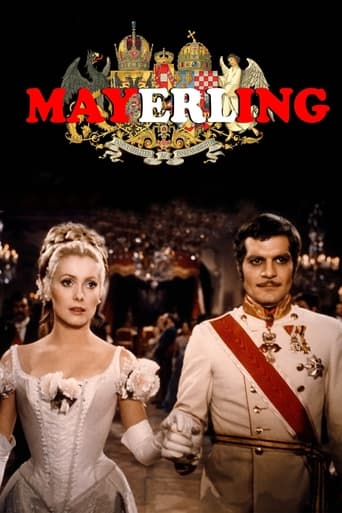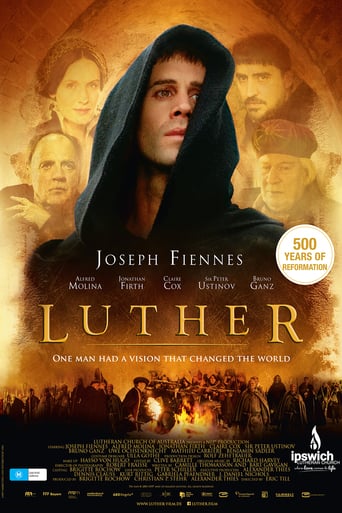


Mayerling
Crown Prince Rudolf of Austria clashes with his father, Emperor Franz Joseph I of Austria, over implementing progressive policies for their country. Rudolf soon feels he is a man born at the wrong time in a country that doesn't realize the need for social reform. The Prince of Wales, later to become Britain's King Edward VII, provides comic relief. Rudolf finds refuge from a loveless marriage with Princess Stéphanie by taking a mistress, Baroness Maria Vetsera. Their untimely demise at Mayerling, the imperial family's hunting lodge, is cloaked in mystery.
-
- Cast:
- Omar Sharif , Catherine Deneuve , James Mason , Ava Gardner , James Robertson Justice , Geneviève Page , Andréa Parisy


Reviews
Good , But It Is Overrated By Some
it is finally so absorbing because it plays like a lyrical road odyssey that’s also a detective story.
Fun premise, good actors, bad writing. This film seemed to have potential at the beginning but it quickly devolves into a trite action film. Ultimately it's very boring.
A terrific literary drama and character piece that shows how the process of creating art can be seen differently by those doing it and those looking at it from the outside.
I have lately been on an Omar Sharif binge. Mayerling is his third movie that I have seen these past few weeks. My mother was a fan of this movie. I never understood why. Now that I am old enough myself I understand the appeal of Mayerling. The sets are opulent. The cinematography is wonderful. And oh my were Omar Sharif and Catherine Deneuve beautiful! They looked incredible together! Although Deneuve's acting lacks a certain passion I felt Omar Sharif's performance, especially in the last scene, was quite touching. James Mason didn't have enough to do despite playing the character of the emperor. Ava Gardner looked older than her age. The sexual content and nudity, though tame by today's standards, is a bit crude. I have watched this movie three times and each time by the end of the movie I am shamelessly crying. Of course such love does not exist in real life but this kind of movies make one wish that it did.
History is so full of questions - what if such and such occurred, or if so and so had lived and not died, or if the weather had not been so bad on the date in question. There are all over the place, and Franklin Roosevelt dismissed this as "iffy" history. But people have hopes, dreams, and imaginations. Sometimes these run away with them.On January 30, 1889 Crown Prince Rudolf Von Hapsburg of the Austro-Hungarian Empire was in his hunting lodge at Mayerling with his mistress Baroness Marie Vetsera. Rudolf was married to Stephanie, sister of King Leopold II of Belgium. They had a daughter, but were unable to have other children - such as a male child (Austria had a male only rule about its Emperors since the death of Maria Theresa, a co-ruler with her husband and later her son in the 18th Century). Rudolf therefore did not care about how his open affair with the Baroness affected his despised wife. However, the Vetseras were nouveau rich minor aristocracy, and it displeased the Emperor Franz Josef and the Empress Elisabeth ("Sisi"). The Emperor and his Prime Minister, Count Taafe, also wanted Rudolf to be more active in pursuing his regular duties at court and in the empire.Rudolf was considered more liberal than the Emperor by many people. He may have been approached about taking the leadership of a separation movement from Hungary as potential King, but if he did nothing came of it.That January day a shot rang out in the middle of the night. Some equerries ran to Rudolf's room but he answered the door and said nothing was wrong. Then, about six hours later, a second shot rang out. This time Rudolf was found with the top of his head blown off. Marie was dead from a shot in the skull too, but she was on her bed. Mayerling (it helps that the scene of the tragedy sounds poetic) has been the subject of several films and television shows and many books. This writer uses the name as his nom-de-plume on another website. There is a fascination with that tragedy - one can see it as that of two young people who died rather than give each other up due to a demanding father. One can see it as the end of the hopes of liberalism in the old Austro-Hungarian Emprire. One even has a sense of the richness of the royal families of Europe in 1889 by the setting in that lodge. It is open to so many interpretations or feelings.The 1936 film with Danielle Darrieux and Charles Boyer is the better version, but this 1968 version with Catherine Deneuve and Omar Sharif is actually quite good. It takes the view that Rudolf was a potential reformer and liberal, and that the reactionaries spurred on the events that led to the deaths. Franz Josef (James Mason) is shown hand-in-glove with the reactionaries (even screaming about Rudolf's friendliness with Jews), and not sympathetic about the need his son might have for Maria's companionship (given the really unlikeable Stephanie). Rudolf tries to make a deal - as an inspector general for the army checking out army weaponry and maneuvers. But nobody pays attention to him. The result is a total collapse of spirit leading to his suicide pact.He does try to escape with Maria. Bertie, Prince of Wales (James Robertson Justice) is visiting - can Rudolf and Maria flee to England for diplomatic immunity? But Bertie knows the drill - when you are finished enjoying yourself go back home to the wife and mother (Alexandra and Victoria). He also knows that the brouhaha of giving shelter to Rudolf and his mistress would not sit well with Lord Salisbury's government, or the government of Germany (Austria's ally) under Otto Von Bismarck.So the film ends with that final suicide, although to enhance the romance the dying Rudolf grabs the hand of his dead lover as a last snub at his father.Was it like that? My romantic side wishes it was. But the evidence shows Rudolf was a weakling, who played with liberalism but really did not believe in it. Franz Josef (a hard working monarch, with his own side-friendship with actress Katherine Schratt) always mourned his wayward son, but he was ashamed of Rudolf's cowardice - what always bothered the old emperor was that Rudolf took six hours to turn his pistol on himself after shooting Maria. He could not make up his mind of doing the honorable thing (completing the suicide pact) or fleeing. Rudolf was a coward to the end.
The Crown Prince Rudolph and Baroness Maria Vetsera are brilliantly played in this motion picture.i highly recommend it to anyone interested in late 19th century Austro-Hungarian history. But bear in mind that the movie, although marvellously done, was based on Anet's book, which is a novel based on the story of what actually happened, so there will be some anomalies, and scenes which did not actually take place. But it is a fantastic movie, Mason's portrayal of the Emperor Franz is particularly superb. I have been trying to locate this movie but I cannot find it available anywhere for purchase, anyone who knows how, please contact me.The tragedy of Mayerling is discovered by each new generation, and with each of those generations, the mystery of it becomes unsolved again. It continues to fascinate everyone who has delved into it, and I am no exception to this. The movie is a marvellous introduction to those discovering Mayerling, but it could be misleading for those looking into it for the first time, from a research point of view. I recommend it particularly to those who know more about the Tragedy, so they can appreciate its brilliance as a movie, and learn the exact historical facts for themselves. With compliments, elisabeth, uk.
All modern historians agree that it was not the "impossible " love depicted in all Mayerling versions.No Rudolph did not throw away his empire for the love of Mary!He had at the time of his affair with baroness Vetsera other mistresses(the most famous was Mizzi Kaspar).Too bad for those who are still dreaming of romantic passion,but the harsh truth is that Rudolph was a jaded man,using morphine to relieve his sufferings .He was seriously ill,since he contracted a VD.Historian Jean-Paul Bled goes as far as to say he would not have outlived his father anyway(think that his father died in 1916!).Just before his death he was not physically the handsome man played by Omar Shariff anymore!As for Mary,she was seventeen (Deneuve was already too old in spite of her stunning beauty),and she did love Prince Rudolph,but she was too young to understand that she was used by her lover as a helping hand to die:Rudolph had already asked Mizzi(see above) to die with him because he was frightened to pass away ALONE.Another scene is completely refuted by every earnest historian:during the ball in the German Embassy,Mary refuses to bow before Rudolph's wife Stephanie.Or ,absolutely nobody,among these who attended the reception,spokeabout it afterward.The only person who mentions it is Countess Marie Larish,who was not invited,and who was a very shady and perverse lady,who wrote a book called "my past" .And what a past!She was Empress Elisabeth's niece,child of a misalliance:Sissi's brother had married an actress.In the Mayerling saga ,she played a very bad part,that of a go-between(Genevieve Page in the movie)The imperial couple reunited James Mason and Ava Gardner ,who were the leads in "Pandora and the flying Dutchman" (Lewin,1951),a treat for cinema buffs.The cinematography is dazzling,and at least the story was filmed where it took place.Francis Lai's score is nice too(Un Homme Et Une Femme,1966,love story,1970).The director ,Terence Young ,is the movies odd-job man:James Bond (Dr No,From Russia with love,thunderball),the amorous adventures of Moll Flanders,wait until dark,the Christmas tree,spy thriller,horror,melodrama,not a genius but a competent craftsman.After Mayerling,the hunting lodge was razed to the ground and the emperor had a nunnery built on the site.Hence the necessity to film the last part in a studio.Another scene completely made up from start to finish is the Deneuve /Gardner meeting.At the time ,Elisabeth had become the wandering empress she would remain until her death in 1898,nine years after the Mayerling tragedy.She used to shun Vienna,the Court ,the étiquette and even politics.But the movie is true for one thing:she was here when Rudolph died.Marie Larish(Genevieve Page),the go-between, was her protégée,but she would realize too late what a perverse creature she was.Rudolph was a depressed man,who failed twice:politically,he was kept out of things by his father and his plots led to nowhere.He used to worry about the Monarchy's (actually a double one,Austrian and Hungarian since 1867)future and he dreamed of federalism and parliamentary democracy;besides,his marriage was on the rocks,his wife Stephanie(Andréa Parisy) being unable to give birth to another child. The opening scene is the only one which deals with politics:a student riot during which Rudolph is arrested by the police:once again,it's very implausible,since the Kronprinz's actions were watched day and night by Francis Joseph's henchmen.Even his numerous -and almost absent here ,to give the movie a romantic flavor-mistresses used to "help" police reports.The best thing-one user noticed it- is Marie Larish's obnoxious behavior.Genevieve Page is remarkable,acting with Mary Vetsera like a spider with a fly,unbeknown-st to her mother (Mony Dalmes).Outside Litvak's version ,already mentioned by some users,there's also Jean Delannoy's "le secret de Mayerling" (1949),with Jean Marais as Rudolph which has a rather good reputation,in spite of a weird ending:Bismarck was behind the lovers' assassination.Even stranger:when Zita,Austria's last empress ,came back from exile in the early eighties,she hinted at a political assassination as well.

